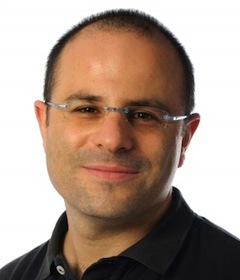The European Parliament. (photo by Treehill via Wikimedia Commons)
Dr. Sharon Pardo is a member of the department of politics and government at Ben-Gurion University of the Negev and the director of the Centre for the Study of European Politics and Society. He has been awarded the Ad personam Jean Monnet Chair – and was the first Israeli scholar to receive it. He also was elected to join the advisory council of Konrad-Adenauer-Stiftung, a think tank funded by the German government, another singular accomplishment for an Israeli scholar. Pardo was in Vancouver last month, where he gave a lecture at the Jewish Community Centre of Greater Vancouver.
A major theme of Pardo’s research is the disjunction between the public stance the European Union has taken on Israeli policies – its “normative position” – and the economic and trade relationships between individual member countries and Israel. Contrary to the common perception that the EU is anti-Israel, Pardo argues that the reality is much more complicated.
“The truth is that trade relations proceed with no regard to the normative position,” explained Pardo to the Jewish Independent in an interview at the Fairmont Hotel Vancouver on Aug. 21. “That is, in fact, the very thing that allows the EU to speak with one voice – the fact that individual member countries know that their own trade relations with Israel will not be affected by the normative position of the EU.”
The professor explained that there are two different voices, “the normative voice on the supranational level and the economic voice on the trade-relations level, on the realpolitik level of the individual member countries. We could say that Europe has a split personality.”

The facts on the ground are that Israel and the EU have such extensive relations that, for most practical purposes, Israel is already a member of the EU, said Pardo. EU members have well-developed trade relations with Israel, and the EU and its members fund research and development and other initiatives in Israel. The EU accounts for 35% of Israeli trade, said Pardo, and perhaps 41% of Israelis are would-be citizens of the EU.
Pardo contends that the critical position of the EU towards Israel on issues related to the occupation and Israel’s wars are not intended for external consumption at all, but are actually directed inwards as a means to establish an integrated European identity.
“These normative positions are being used to shape the new European identity through asserting shared values,” he said. “They are for internal consumption. The EU has striven to unite 508 million citizens around a set of values – the rule of law, human rights, etc. – which are perceived as European values. Since 1957, Europe has been asking the question, ‘Who are we? How do we define ourselves?’ One way to define ourselves is against the other. Israel is the ultimate other: Israel is part of us, but Israel is what we are not.”
Citing as an example of the emptiness of many of the EU’s statements, Pardo pointed to the 2012 EU guidelines for the territories occupied by Israel.
“We call these ‘guidelines for nothing,’” said the professor. “There are a total of five research institutions in the territories, none of them were ever supported by the EU. There was one institution, Ahava, a private project which received some funding. The reason it is so easy for the EU to author those guidelines is that there is no trade there. A total of 0.6% of Israeli trade with the EU comes from the territories.”
As an expert on the EU, Pardo can also speak to Brexit. He calls it “an accident, both at the U.K. and EU levels. Brexit was not meant to issue in a real British exit,” he said. “Little Britain surprised David Cameron – the amount of euro-skepticism was underestimated.”
Pardo worries that there will be dire consequences for Britain, and potential negative fallout for Israel as well.
“This is going to be a nightmare for the British economy and the city of London,” he said. “The EU has no choice but to crush the city of London because it will be unregulated in its competition against other European capitals. The EU cannot offer them a good deal – they can only be offered the worst deal possible, and they will be offered the worst deal possible. Theresa May is stuck with this strange decision, which is a result of PR companies manipulating the British public. Just imagine having now having to negotiate 192 new trade agreements with the rest of the world!”
While Pardo is optimistic about the relationship between Israel and the Jewish people and the British leadership, he is concerned about the effects of Brexit on Israel as a country.
“David Cameron was one of the friendliest European leaders to Israel, and Theresa May will also be friendly. She has been a friend to the Jewish people and an enemy of antisemitism,” he said.
But, he added, “Brexit can weaken the European integration project and have major implications for Israel.”
Pardo said it is essential for Israel to adopt a more explicit “grand strategy” with regards to the EU.
“Israel needs the EU,” he said, “and we need to be clearer about what we want from our relationship and how we plan to conduct it. We will not serve our own interests with the kind of anti-EU rhetoric that some Israeli politicians employ simply to get votes from an Israeli public that resents the normative positions of the EU.”
Matthew Gindin is a Vancouver freelance writer and journalist. He blogs on spirituality and social justice at seeking her voice (hashkata.com) and has been published in the Forward, Tikkun, Elephant Journal and elsewhere.

